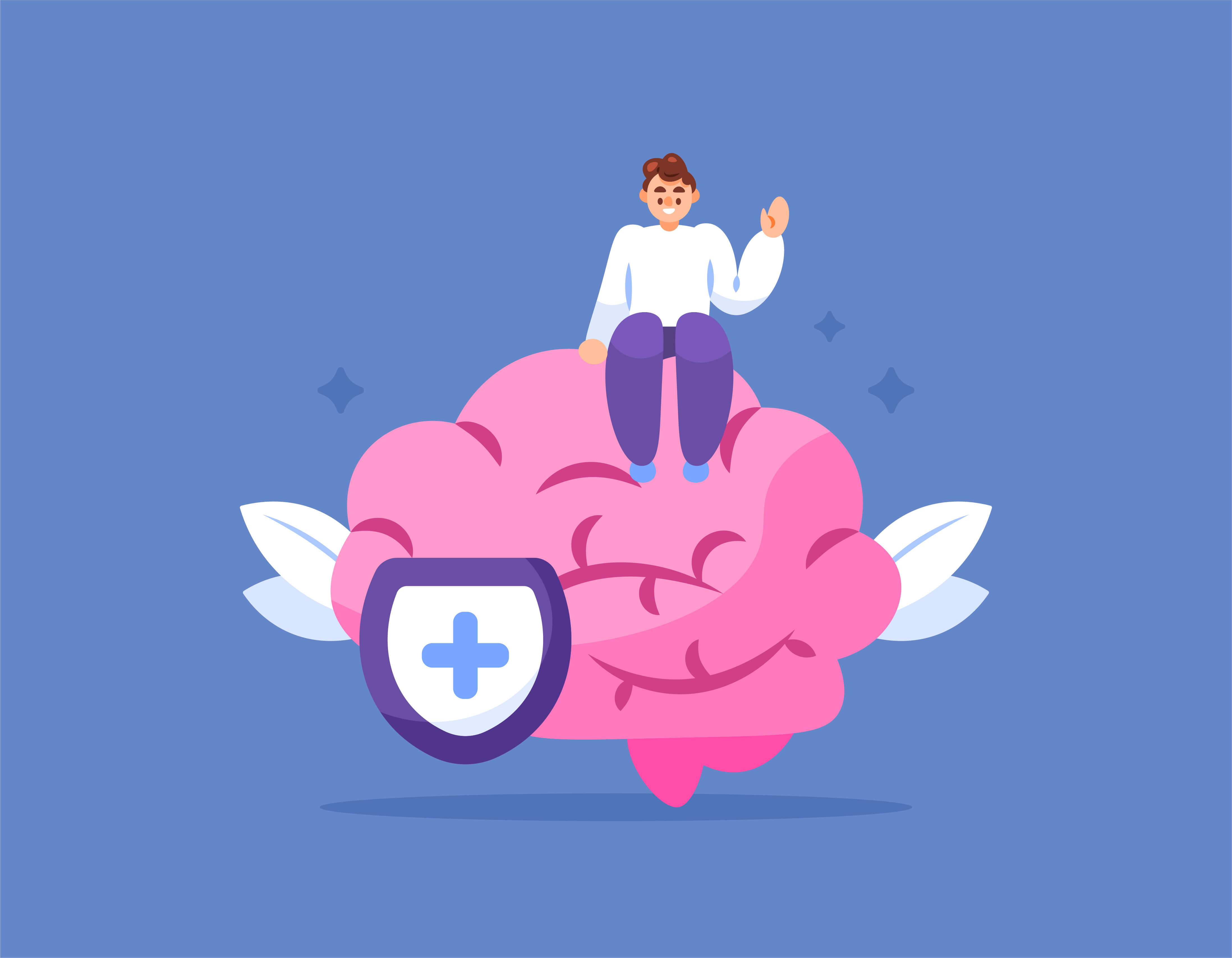With one in four people in the UK experiencing a mental health problem each year, it's more than fair to say that someone in your business, be it an employee, business partner, or even you, will be affected in some way by mental health at some point.
Whilst a lot of effort has been put into raising awareness for mental health, particularly in the workplace, the fact remains that there is still a lot of work to do when it comes to supporting people with their mental health.
So, what can you as an employer do to ensure the mental wellbeing of your staff in the working environment? To help answer this question, Croner has compiled an extensive guide to mental health and how you can help support your employees, your business and even yourself with better mental health.
To get immediate support and advice with employees’ mental health and how you can better mental health in your workplace contact Croner's experts on 0800 470 2593.

What is mental health?
When we think of mental health, we still collectively have an underlying tendency to go straight to the negative elements of mental health like mental health conditions such as anxiety and depression, as well as mental disorders like schizophrenia.

By definition mental health is described by the World Health Organization (WHO) as:
"A state of mental well-being that enables people to cope with the stresses of life, realize their abilities, learn well and work well, and contribute to their community. It is an integral component of health and well-being that underpins our individual and collective abilities to make decisions, build relationships and shape the world we live in. Mental health is a basic human right. And it is crucial to personal, community and socio-economic development."
The truth is that we all have mental health, and much like our physical health, this can be good or poor (and everything in between).
Unfortunately, unlike physical health, mental health isn't (for the most part) visible, so typically we tend not to recognise the signs and symptoms of mental health problems as we would a physical health issue, like a broken leg, for instance.

When it comes to mental health problems there are some common ones that are referenced regularly, such as depression and anxiety. Some types of mental health conditions are a response to external factors and stress, whereas there may be some mental health disorders with more clinical, biological factors.
Whilst there are plenty of resources and self-help resources available to support and maintain good mental health, be aware that this might not always work for some people, especially employees that are diagnosed with mental disorders. For instance, an employee diagnosed with bipolar disorder might be able to manage their condition on their own but occasionally seek specialist support and need access to professional mental health services.
It's important to remain non-judgmental when it comes to matters involving mental health, practice empathy and remember that creating an open and honest conversation about mental health is a vital step in the right direction.
Why should businesses be concerned about mental health?
Poor mental health is as serious an issue as physical health. As well as the human cost (it was reported in 2019 that the suicide rate was at 11.2 per 100,000 in the population), there is a worrying rate of people with long term mental health issues falling out of work (300,000 reported as of June 2024).

In 2022, the AXA Mind Health Study reported that the UK (alongside the USA) was found to have the largest proportion of employees experiencing mental health issues. The total cost of poor mental health in the workplace to employers was a staggering £28 billion!
Despite the worrying statistics there are ways and means to help address the issues surrounding mental health in the workplace, and promote positive mental health as a whole.
What are the benefits of promoting good mental health at work?
When employees have good mental health, your business does better. Employees have the capacity to reach their full potential both inside and outside of the workplace; and life's challenges, that we all deal with, are more easily dealt with.

On the contrary, failure to address mental health concerns can lead to employees performing poorly, your business under performing and not to mention losing talent. Therefore it's in your business' best interests to have the right approach when it comes to mental health support in the workplace.
Better mental health in the workplace can reduce staff turnover
Promoting good mental health in your workplace can have a significant impact on the number of staff that leave your organisation. Employees that feel comfortable and supported are less likely to feel stressed and develop (or exacerbate pre-existing) mental health conditions, such as anxiety.
Staff are more likely to stay in a company where they feel valued and have the support made available to them, which means that your business isn't spending money on re-hiring for vacated roles. A business that has a high staff retention and engagement rate also attracts the best talent to your company.
Improved employee productivity
If employees are in a good place mentally then they are likely to deliver consistent and better work. A happy workforce is a productive workforce. This has two major benefits; firstly, that the working environment is a positive place to work in, and secondly, that your business is functioning in a more efficient manner.

Good mental health amongst employees leads to a reduction in absenteeism
The better your employees’ mental health, the less sickness absences you will experience due to poor mental health. Simply put, the healthier staff you have, the better your business will function.
What are the signs an employee might be struggling with their mental health?
This can be a particularly tough topic to tackle because, much like human beings as a whole, they can vary drastically from person to person. One person might be in the grip of severe depression and even be suicidal yet show very little sign in person that they are struggling at all. Another person might show clear symptoms, such as withdrawal.

However, with that said there are some symptoms of poor mental health that are worth checking up on, even if it turns out to be a false alarm these are (but are not necessarily limited to):
- Acting anxious, tired and/or withdrawn.
- Inability to focus on tasks.
- Declines in the usual standard of their work.
- A lack of interest in tasks that the employee previously enjoyed.
- Acting out of character, changes in mood and how they interact with colleagues.
- Increased sickness absence or lack of punctuality for work.
Please note, whilst these are some common symptoms of someone struggling with their mental health, there may be other indicators. As an employer the best way to find out if an employee is struggling is to create a safe space for them to be able to come forward and talk freely about their experiences.
How can your business support employees with their mental health?
As we've seen from the stats, the impact of ignoring concerns about mental health in the workplace can have severe consequences. But as an employer it can be difficult to know how to broach the subject of mental health, particularly if you suspect someone is struggling.

There are several ways your business can provide support to employees with their mental health.
Offer mental health awareness training to staff and management
Ensuring staff have awareness of mental health and your management have training and the right people skills will go a good way to helping promote good mental health in the workplace.
Management with the knowledge and training in people management and an awareness of mental health can have a huge impact on the overall wellbeing of your staff. A good manager can help reduce the amount of stress employees feel, make them feel valued as well as supported.
Furthermore, if they are well versed with mental health training, they might potentially be able to spot when an employee is struggling, this is an important skill when it comes to mental health crisis prevention, as sometimes the signs are subtle.
Actively promote a healthy work-life balance
Ensure staff have adequate time to take breaks during the working day and encourage disconnection after the working day is done. Working long hours with insufficient breaks is a sure way for staff to burnout, which can put a strain on the remaining staff (causing them to potentially burnout) as well as costly periods of sickness absences.
Offering incentives like flexible working, hybrid working options and/or adjusting their start times and finishes can go a long way to improving mental health and reducing the risk of employee burnout.
Increase staff awareness of mental health services and EAPs
An Employee Assistance programme, or EAP for short, is a great way for employees to access mental health support easily and effectively. They can include services like access to a qualified mental health counsellor as well as information and resources to support them with their mental health.
Mental health and wellbeing falls under The Health & Safety at Work Act
As an employer, you have an obligation to your employees’ health and safety. This falls under your 'duty of care' in the Health & Safety at Work etc. Act 1974. Employers must ensure that the working environment is safe, that staff are protected from discrimination and carry out risk assessments. Employers must also ensure that they treat both physical health and mental health with equal parity.

Mental health and discrimination
By law someone with poor mental health can be considered disabled if they fit the following criteria:
- Their mental health condition has a 'substantial adverse effect' on their life.
- The issue is expected to last 12 months or more.
- Their mental health problems affect their ability to do their normal day-to-day activities.
An employee can still be considered disabled if they have poor mental health even if they do not exhibit symptoms all the time.
In the case of an employee being considered disabled, as an employer:
- You must not discriminate against them because of their disability.
- You must make reasonable adjustments.
Working with your employee to ensure the right adjustments for them (even in the case of no disability) is a good idea.
Get expert advice on mental health at work from the Croner professionals
With 80 years, supporting employers we can draw on a wealth of experience when it comes to finding the right solution for your business. With award-winning advisors in every facet of Health & Safety, Employment Law, HR and more, we can offer your business 24 hour a day support, 365 days a year!
Call Croner today on 0800 470 2593.
Related resources
Categories
- Business Advice
- Culture & Performance
- Disciplinary & Grievances
- Dismissals & Conduct
- Employee Conduct
- Employment Contracts and Documentation
- Employment Law
- Employment Rights Bill
- End of Contract
- Equality & Discrimination
- Health & Safety
- Hiring and Managing
- Leave & Absence
- Managing Health & Safety
- Moving
- Occupational Health
- Pay & Benefits
- Recruitment
- Risk & Welfare



